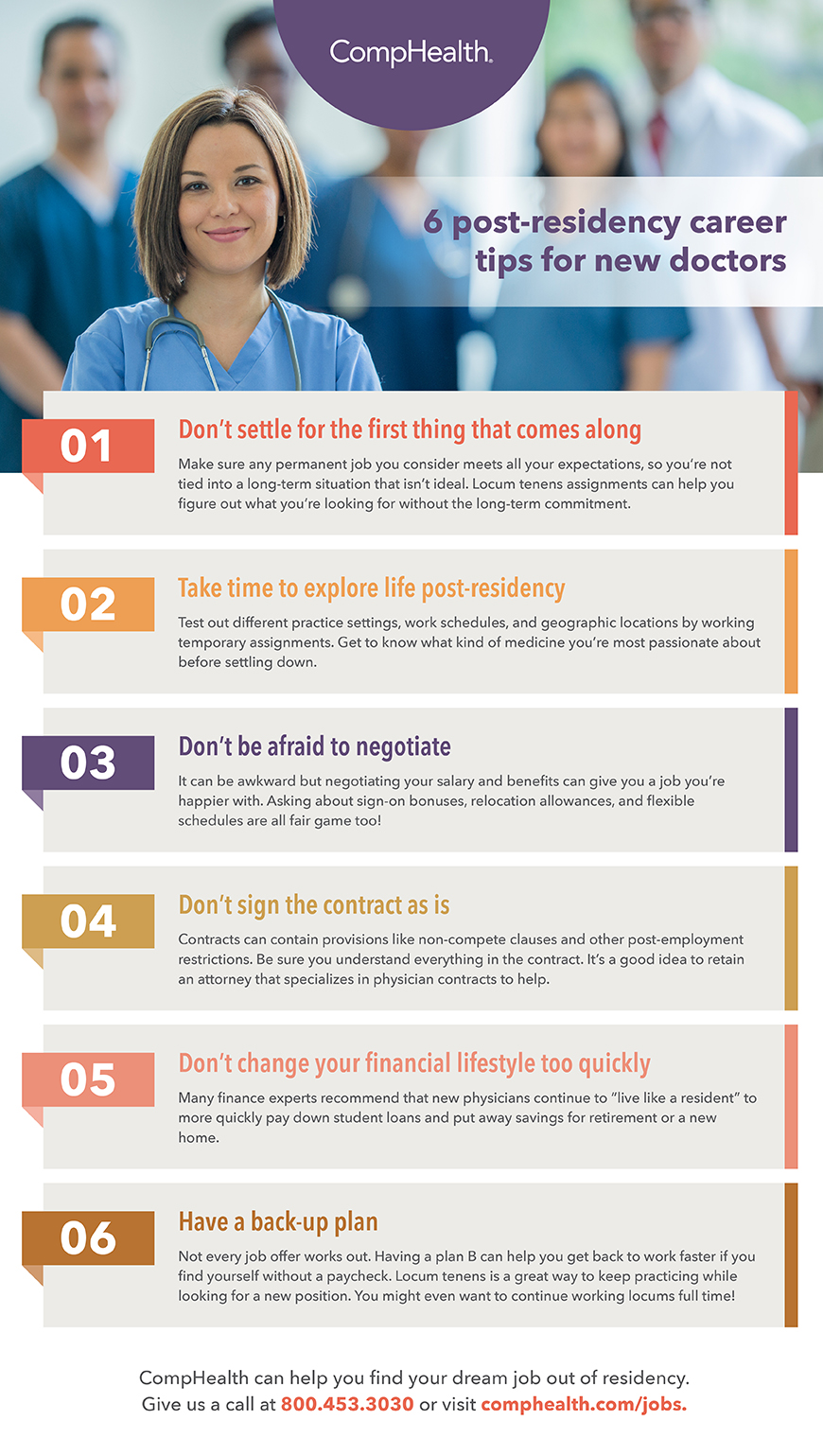Completion of a residency is a major turning point for a new physician. The future you’ve worked so hard for is just a heartbeat away, and in this pivotal moment, you’ll need to make decisions that could have a lasting impact on your career. Here are six tips that can help you avoid common post-residency missteps and thrive in a career that will live up to the future you envisioned.

1. Don’t settle for the first thing that comes along
Permanent jobs aren’t really permanent — but they are typically long term. Many new physicians feel pressured to accept the first solid job offer that comes their way post-residency, even if it doesn’t meet their expectations. But taking that job could tie you long term to something that isn’t ideal.
To avoid settling for second best, consider working locum tenens assignments while continuing to look for a permanent job that checks the right boxes. And you never know—that temporary assignment could turn out to be the perfect match.
2. Take time to explore life post-residency

After his residency, Dr. Colin Zhu decided to begin his career working locum tenens positions so he could “date” different positions and practice settings. “I felt like I was able to figure out what type of healthcare professional I needed to be,” he explains. “You don’t really know what fits for you until you find something that works. You don’t know until you go out and try.”
Locum tenens lets new physicians experiment with inpatient or outpatient settings, different work schedules, rural and urban settings, and various practice sizes, among other things — before making a long-term commitment that can leave you feeling disillusioned and burned out.
3. Don’t be afraid to negotiate
Hospitalist Dr. John Thieszen admits that asking for more money can be awkward. But he says those few moments of discomfort can pay off handsomely. “I felt very awkward asking for any more money,” he recalls. “But in the 30 seconds that I felt awkward asking about it, the hospital agreed to $20,000 as a sign-on bonus. That was the best 30 seconds of awkwardness I spent.”
Negotiating is “where some of the easiest money in the world is to be made,” says Dr. Thieszen. It never hurts to simply ask about things like an increased salary, sign-on bonuses, or a relocation allowance.
4. Don’t sign the contract as is
Many newly minted physicians think the employment contract is merely a formality. But it can contain some crucial provisions, like non-competition agreements and other post-employment restrictions. “The contract will more often than not come into play at some point,” says Dr. Thieszen.
“Even though a hospital is a big organization, you can negotiate these contracts,” he says. Dr. Thieszen recommends that any physician facing a new job opportunity hire an attorney to review the contract before signing it.
5. Don’t change your financial lifestyle too quickly

When the paychecks start coming in — after years of living a frugal student lifestyle — the temptation to spend it can be enormous. But White Coat Investor recommends continuing to “live like a resident” for as long as you can for several reasons: you can pay off your student loans faster, you can begin maxing out your contributions to a retirement plan, and you can amass a down payment on a home. The short-term sacrifice will pay off enormously down the road.
And if you don’t immediately tie yourself down with auto and home loans, you’ll have greater freedom to switch jobs if you find yourself in a less-than-ideal situation.
6. Have a back-up plan
Pediatrician Dr. Baraa Alrazzak thought he had a job lined up with the program where he completed his residency. “But there were some last-minute changes in the plan, and I found myself stuck,” he says. He knew securing a new position could take months. Luckily, he met a doctor who worked locum tenens for CompHealth, and he realized that working locum tenens would give him ample time to explore his options and move forward.
Even when the initial plan pans out, things might not be what they seem. Investing Doc estimates that 40–70% of physicians end up switching jobs within five years of starting their first job. That high churn rate could be due to a disconnect between how the job was sold to the physician and what it turned out to be in reality.
That’s why it’s important to go into that first job post-residency with your eyes open, realizing that it is likely not your final destination but merely a stepping stone to new opportunities. Live frugally and save as much as you can—and remember that locum tenens work is a versatile back-up plan that can keep you afloat as you chart your new course. Or it can even turn into your ultimate destination.
CompHealth can help you find your dream job out of residency. Give us a call at 800.453.3030 or view today's physician job opportunities.
 Blog
Blog